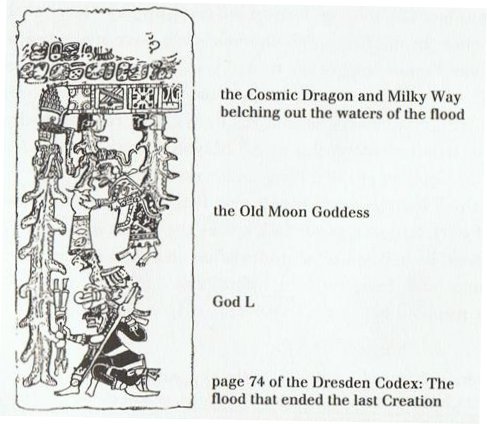140. The end of side a on the C tablet was neither
at Denebola nor at Dzaneb - possibly a name
equivalent to Deneb, the 'Tail end' of the
equinoctial year when for 3 dark days only cold food
was served, when the Sun hero was inside the Belly
of the Fish (Baten Kaitos).
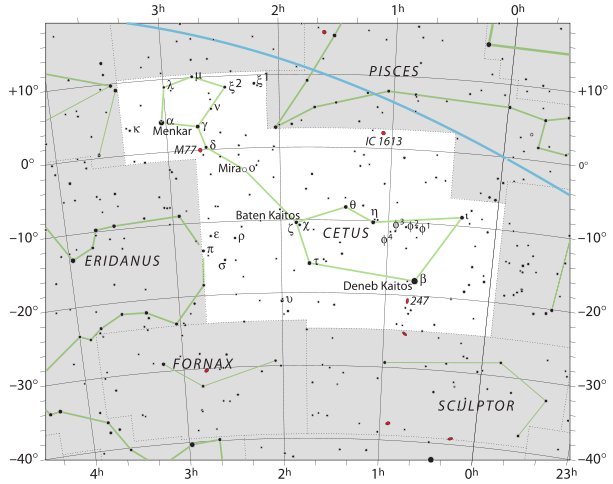
...
Heracles's rescue of Hesione, parallelled by
Perseus's rescue of Andromeda ... is clearly derived
from an icon common in Syria and Asia Minor:
Marduk's conquest of the Sea-monster Tiamat, an
emanation of the goddess Ishtar, whose power he
annulled by chaining her to a rock. Heracles is
swallowed by Tiamat, and disappears for three days
before fighting his way out. So also, according to a
Hebrew moral tale apparently based on the same icon,
Jonah spent three days in the Whale's belly; and so
Marduk's representative, the king of Babylon, spent
a period in demise every year, during which he was
supposedly fighting Tiamat ... Marduk's or Perseus's
white solar horse here becomes the reward for
Hesione's rescue. Heracles's loss of hair emphasizes
his solar character: a shearing of the sacred king's
locks when the year came to an end, typified the
reduction of his magical strength, as in the story
of Samson ... When he reappeared, he had no more
hair than an infant ...

...Then the big Fish did swallow him, and he
had done acts worthy of blame.
Had it not been that he (repented and)
glorified Allah, He would certainly have
remained inside the Fish till the Day of
Resurrection. - Qur'an, chapter 37
(As-Saaffat), verse 139–144.
But We cast him forth on the naked shore in
a state of sickness,
And We caused to grow, over him, a spreading
plant of the gourd kind.
And We sent him (on a mission) to a hundred
thousand (men) or more.
And they believed; so We permitted them to
enjoy (their life) for a while. - Qur'an,
chapter 37 (As-Saaffat), verse 145–148 ...
... From Regulus (α Leonis,
*152) in one year to Denebola (β Leonis,
*178) in the next year there were 26 + 366 =
392 right ascension days, equal to the
number of glyphs on side a of the C tablet.
March 17 (76, *362) - 27 = 49 ('February 18,
*335) when in Roman times Dzaneb (ω Piscium)
had risen with the Sun ...
*365 - *3 = *362 (Dzaneb), and *3 + *27 = *30
(Hamal) at glyph number 366 + 30 = 396 (Cb1-4):
... There were 10 Star Kings before the
Deluge and the first one of them was Hamal (α
Arietis):
... Strassmeier and Epping, in their
Astronomishes aus Babylon, say that
there its stars formed the third of the
twenty-eight ecliptic constellations, -
Arku-sha-rishu-ku, literally the
Back of the Head of Ku, - which had been
established along that great circle
milleniums before our era; and Lenormant
quotes, as an individual title from
cuneiform inscriptions, Dil-kar, the
Proclaimer of Dawn, that Jensen reads
As-kar, and others Dil-gan, the
Messenger of Light.
George Smith inferred from the tablets that
it might be the Star of the Flocks;
while other Euphratean names have been Lu-lim,
or Lu-nit, the Ram's Eye; and
Si-mal or Si-mul, the Horn star,
which came down even to late astrology as
the Ram's Horn.
It also was Anuv, and had its
constellation's titles I-ku and
I-ku-u, - by abbreviation Ku, -
the Prince, or the Leading One, the Ram that
led the heavenly flock, some of íts titles
at a different date being applied to Capella
of Auriga.
Brown associates it with Aloros, the first
of the ten mythical kings of Akkad anterior
to the Deluge, the duration of whose reigns
proportionately coincided with the distances
apart of the ten chief ecliptic stars
beginning with Hamal, and he deduces from
this kingly title the Assyrian Ailuv,
and hence the Hebrew Ayil; the other
stars corresponding to the other mythical
kings being Alcyone, Aldebaran, Pollux,
Regulus, Spica, Antares, Algenib, Deneb
Algedi, and Scheat ...
The creator of the text evidently decided to let the beginning of side b on the
tablet coincide
with the day when Sheratan (*27) - the First Point
of Aries - was at the Full
Moon, i.e. to have Polaris (*26) at the
last glyph on side a:
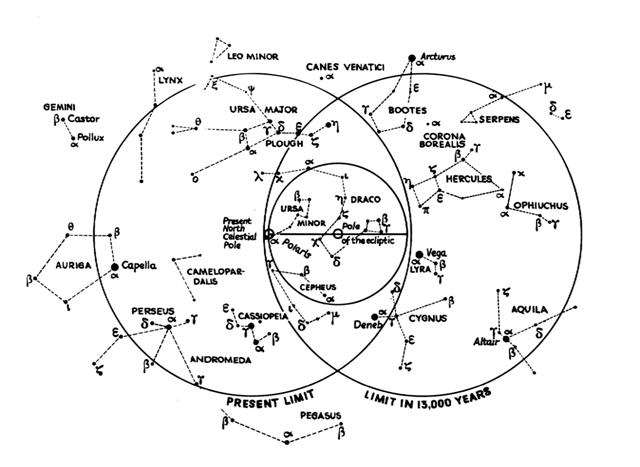
 |
 |
 |
 |
 |
|
Ca13-16 |
Ca13-17 |
Ca13-18 (361) |
Ca13-19 |
Ca13-20 (→ 260) |
|
oho te vae |
tagata puoko
erua |
tagata puo
pouo |
vero hia |
- |
|
INVISIBLY CLOSE
TO THE SUN
(helical dates): |
|
Sept 13 (256) |
14 (*177 = *360
- 183) |
DENEB-OLA |
16 |
17 (*180) |
|
ºSept 9 (252 =
69 + 183) |
10 (*173) |
11 |
12 (255) |
13 |
|
'Aug 17 (229) |
18 (*150) |
19 |
20 |
21 |
|
"Aug 3 (215) |
4 (*136) |
5 |
6 |
7 |
|
JULY 11 (192) |
12 |
13 |
14 |
15 (196 = 88 +
108) |
|
The Polynesian
ear probably
heard -ola in
Denebola as
ola (life) -
i.e. this was
the place where
the Lion of
Summer (ho-ra)
ended, where he
had his tail,
deneb.
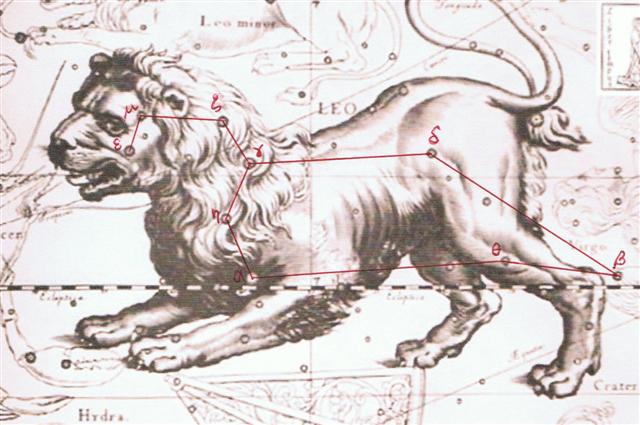
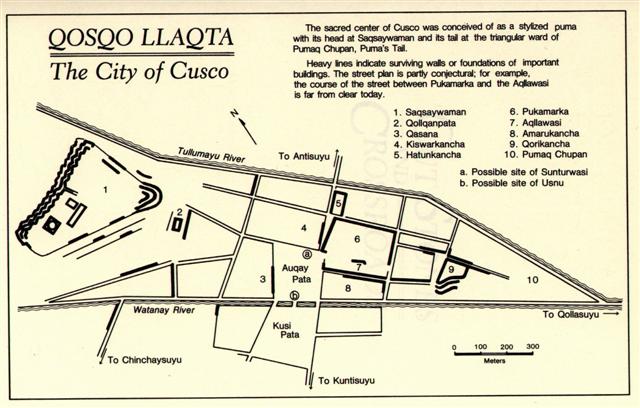
... tenebræ,
Holy Week
devotion (matins
and lauds) at
which candles
lighted at the
beginning are
successively put
out. XVII. L.
(pl.), parallel
to Skr. támah,
g. támasah,
Lith. tamsà,
Lett. timsa
darkness, and
referred to
*tem∂srā and
cogn. with Skr.,
Baltic. and
Celtic forms.
(English
Etymology)
...
Like archaic
China and
certain
Amero-Indian
societies,
Europe, until
quite recently,
celebrated a
rite involving
the
extinguishing
and renewal of
domestic fires,
preceded by
fasting and the
use of the
instruments of
darkness. This
series of events
took place just
before Easter,
so that the
'darkness' which
prevailed in the
church during
the service of
the same name (Tenebrae),
could symbolize
both the
extinguishing of
domestic fires
and the darkness
which covered
the earth at the
moment of
Christ's death.
In all
Catholic
countries it was
customary to
extinguish the
lights in the
churches on
Easter Eve and
then make a new
fire sometimes
with flint or
with the help of
a burning-glass.
Frazer brings
together
numerous
instances which
show that this
fire was used to
give every house
new fire ...
... And so they
waited there in
the darkness at
the place where
the sun rises.
At length the
day dawned, a
chilly grey at
first, then
flaming red. And
the sun came up
from his pit,
suspecting
nothing. His
fire spread over
the mountains,
and the sea was
all glittering.
He was there,
the great sun
himself, to be
seen by the
brothers more
closely than any
man had ever
seen him. He
rose out of the
pit until his
head was through
the noose, and
then his
shoulders. Then
Maui
shouted, and the
ropes were
pulled, the
noose ran taut.
The huge and
flaming creature
struggled and
threshed, and
leapt this way
and that, and
the noose jerked
up and down and
back and forth;
but the more the
captive
struggled, the
more tightly it
held. Then out
rushed Maui
with his
enchanted
weapon, and beat
the sun about
the head, and
beat his face
most cruelly.
The sun screamed
out, and groaned
and shrieked,
and Maui
struck him
savage blows,
until the sun
was begging him
for mercy. The
brothers held
the ropes tight,
as they had been
told, and held
on for a long
time yet. Then
at last when
Maui gave
the signal they
let him go, and
the ropes came
loose, and the
sun crept slowly
and feebly on
his course that
day, and has
done ever since.
Hence the days
are longer than
they formerly
were. It was
during this
struggle with
the sun that his
second name was
learned by man.
At the height of
his agony the
sun cried out:
'Why am I
treated by you
in this way? Do
you know what it
is you are
doing. O you
men? Why do you
wish to kill
Tama nui te ra?'
This was his
name, meaning
Great Son of the
Day, which was
never known
before ... |
|
CLOSE TO THE
FULL MOON (and
nakshatra
dates): |
|
March 14 (→ π) |
15 (*360) |
16 |
DZANEB |
18 (77 = 260 -
183) |
|
ºMarch 10 (69) |
11 (*356) |
12 (*354 + *3) |
13 (72) |
3-14 |
|
'Febr 15 (46 =
73 - 27) |
16 (*333) |
17 |
18 |
19 (50) |
|
"Febr 1 (32 = 73
- 41) |
2 (*319) |
3 |
4 |
5 (36) |
|
9 (375 = 73 - 64
+ 366) |
JAN 10 (*296) |
11 |
12 |
13 |
|
When around
10500 BC the Leo
constellation
had risen with
the Sun at the
northern spring
equinox (0h)
Orion would have
been there a
quarter of a
year earlier in
midwinter. Right
ascension
increases
towards the
east. From
Betelgeuze (*88)
to Regulus
(*152) there
were *64 right
ascension days.
The Sphinx
pointed at Leo
and the 3 great
pyramids towards
the triplet of
stars in Orion's
Belt (Tau-toru)
which came
earlier in the
year:
.jpg)
|
|
The 3 'stones' (Tau-toru)
inside the House
of Orion the Giant (Bet-el-geuze)
can now be
understood as
corresponding to
those 3 days
when the Sun in
his garment of Támah,
Tama nui te
ra,
Timsa,
etc. was forced to
move slowly at
the winter
solstice.
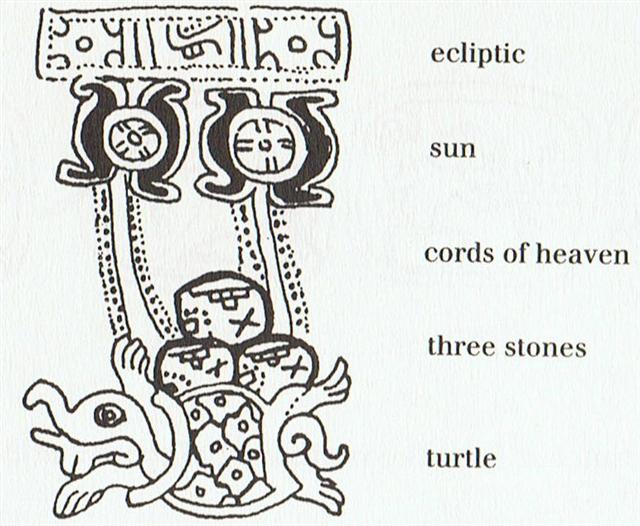
... In the
Polynesian this
[tama na,
father in the
Efaté language]
is distinguished
from táma
child by the
accent tamā
or by the
addition of a
final syllable
which
automatically
secures the same
incidence of the
accent,
tamái,
tamana
...
... In Jewish
mythology it was
the word emet
that was carved
into the head of
the Golem
which ultimately
gave it life.
But when the
letter 'aleph'
was erased from
the Golem's
forehead, what
was left was 'met'
- dead. And so
the Golem
died ...
 |
 |
 |
|
Ga1-19 |
Ga1-20 |
Ga1-21 →
121 = 11
* 11 |
|
KHAFRE
ALNILAM
= ε
Orionis |
MENKAURE
ALNITAK
= ζ
Orionis |
*85 |
|
June 12 |
13 |
14 |
|
'May 16
(136) |
17 |
18 |
|
"May 2 |
3 (123) |
4 |
|
APRIL 9
(*19) |
10 |
11 (101
= 165 -
64) |
|
79 = 19
+ 60 |
80 = 84
- 4 |
81 = 101
- 20 |
121
(Ga1-21) = 11 * 11
and 3 * 121 =
363.
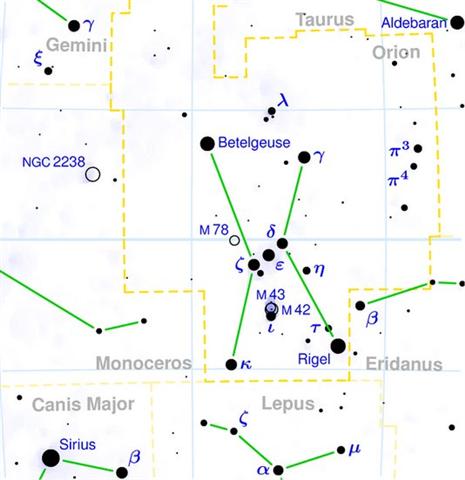 |
 |
 |
 |
 |
 |
 |
|
*Ca14-24 (→ 336) |
*Ca14-25 (→ 350) |
*Ca14-26 (→ 364) |
*Ca14-27 (→ 378) |
*Ca14-28 (→ 392) |
*Ca14-29 (392) |
|
te henua |
te honu
kau |
manu kake
rua |
te henua |
te honu |
te rima |
|
INVISIBLY CLOSE TO THE SUN
(helical dates): |
|
Oct 11 (265 + 19) |
HEZE
(ζ Virginis) |
13 (*206) |
14 (104 + 183) |
BENETNASH |
16 (289) |
|
ºOct 7 (261 + 19) |
8 (*201) |
9 |
10 |
11 |
12 (285 = 365 - 80) |
|
'Sept 14 (238 + 19) |
15 |
16 |
17 (260) |
18 |
19 (*182) |
|
"Aug 31 (224 + 19) |
"Sept 1 |
2 (*165) |
3 |
4 |
5 (248) |
|
AUG 8 (201 + 19) |
9 |
10 |
11 |
12 (*144 = 208 - 64) |
13 (225 = 15 * 15) |
|
181 + 19 = 200 |
201 = 205 - 4 |
202 = 222 - 20 |
203 = 20 + 183 |
204 |
205 |
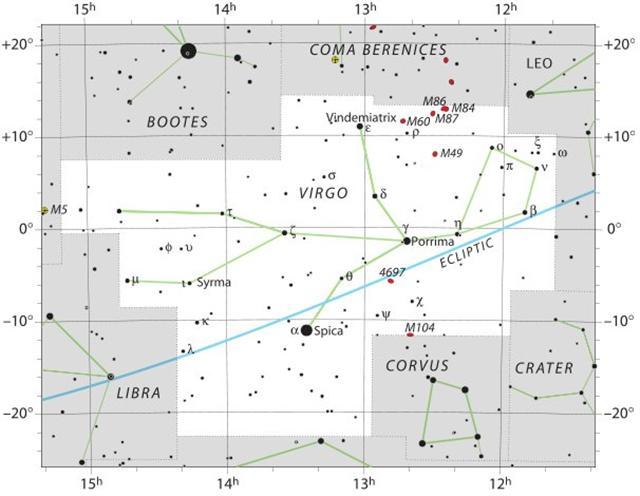
... The name [Benetnash]
derives from the Arabic
phrase meaning 'The leader
of the daughters of the
bier'. The daughters of the
bier, i.e. the mourning
maidens, are the three stars
of the handle of the Big
Dipper, Alkaid,
Mizar, and Alioth;
while the four stars of the
bowl, Megrez,
Phecda, Merak,
and Dubhe, are the
bier ... |
|
CLOSE TO THE FULL MOON (and
nakshatra dates): |
|
April 11 (82 + 19) |
12 |
ACHERNAR
(End of the River) |
4-14 (104) |
BATEN KAITOS
(Belly of the Fish) |
ANA-NIA-10
(Pillar-to-fish by)
POLARIS |
|
ºApril 7 (78 + 19) |
8 |
9 |
10 (100) |
11 (*21) |
12 |
|
'March 15 (*360) |
16 |
17 |
18 (77
= 104 - 27) |
19 (*364) |
20 |
|
"March 1 (41 + 19) |
2 |
3 |
4 (63) |
5 (*350) |
6 |
|
FEBR 6 (101 - 64 = 37)
|
7 |
8 |
9 (40) |
10 (*327) |
11 |
|
364 + 19 = 383 |
18 = 201 - 183 |
19 |
20 = 40 - 20 |
21 |
22 |
|
Polaris was
the 10th and last of the
Tahitian star pillars (Ana).
Here new Land should be
'fished up' from the deeps.
The Sea was beginning at
Nunki (*288) and could
possibly have stretched for 15
weeks, because 15 * 7 = 105
and *288 + *105 = *393 = *27
(Sheratan) + *366.
... This [σ
Sagittarii] has been
identified with Nunki
of the Euphratean Tablet
of the Thirty Stars, the
Star of the Proclamation of
the Sea, this Sea
being the quarter occupied
by Aquarius, Capricornus,
Delphinus, Pisces, and
Pisces Australis. It is the
same space in the sky that
Aratos designated as
Water
...
... The brothers of Maui sat
trembling in the middle of
the canoe, fearing for their
lives. For now the water was
frothing and heaving, and
great hot bubbles were
coming up, and steam, and
Maui was chanting the
incantation called Hiki,
which makes heavy weights
light.
At length there appeared
beside them the gable and
thatched roof of the house
of Tonganui, and not only
the house, but a huge piece
of the land attached to it.
The brothers wailed, and
beat their heads, as they
saw that Maui had fished up
land, Te Ika a Maui,
the fish of Maui. And there
were houses on it, and fires
burning, and people going
about their daily tasks.
Then Maui hitched his line
round one of the paddles
laid under a pair of
thwarts, and picked up his
maro, and put it on
again ...
The month
of Father Light (Jus Piter), June,
was on Easter Island named Maro (also
meaning dry, or
loin-cloth) and winter solstice occured in
June 21 (*92), i.e. 10 days after Mintaka
had risen with the
Sun. South of the equator winter solstice
was at the opposite side of the calendar
year. Thus Orion (and all the other stars) had
moved ahead with around 11 (= 366 - 355 =
from December 21 to January 1) + 80 + *82
(Mintaka) = 173 precessional days since the
time when Orion had been at the northern
winter solstice. 173 * 71 = 1842 AD + 10441
BC. |
 |
 |
 |
 |
|
Cb1-1 (393) |
Cb1-2 |
Cb1-3 |
Cb1-4 (396) |
|
E tupu -
ki roto |
o te hau
tea |
ki te
henua - te maro |
|
INVISIBLY CLOSE TO THE SUN
(helical dates): |
|
*210 |
*211 |
THUBAN
(Dragon) |
*213 |
|
Oct 17 (290 = 107 + 183) |
18 |
19 (*212 = *29 + 183) |
20 |
|
ºOct 13 (*23 + 183) |
14 (*211 - 4) |
15 (288) |
16 |
|
'Sept
20 (*183) |
21 (264 = 287 - 37 |
EQUINOX |
23 |
|
"Sept
6 (249 = 66 + 183) |
7 |
8 (*171 = *354 - 183 |
9 (252 = 293 - 41) |
|
AUG
14 |
15 (227 = 264 - 37) |
16 (*148) |
17 |
|
206 = 290 - 84 |
207 = 227 - 20 |
208 = 25 + 183 |
209 = 213 - 4 |
|
... The ubiquitous 288 was
also (cfr JANUARY 3, *288)
the day number the Pope
Gregory XIII had decided on
for launching his new
calendar:
... The Julian calendar day
Thursday, 4 October 1582 was
followed by the first day of
the Gregorian calendar,
Friday, 15 October 1582 (the
cycle of weekdays was not
affected) ...
But at the time of
rongorongo - after the
precession had corrected his
error in not going all the
way down to Caesar, only
down to 325 AD (the Council
of Nicaea) - day 288 (= 325
- 37) had become the proper
place for Antares to rise
with the Sun. Tangaroa
Uri 15 ("October 15) was
when the Royal Double Canoe
was reaching Easter Island
... |
|
CLOSE TO THE FULL MOON (and
nakshatra dates): |
|
Al Sharatain-1 /
Ashvini-1 /
Bond-16 (Dog) /
Mahrū-sha-rishu-ku-1
(Front of the Head of Ku)
SHERATAN |
*28 |
ALRISHA (The
Knot) |
HAMAL |
|
April 17 (107) |
18 |
19 (*29) |
20 |
|
ºApril 13 (*23) |
4-14 (104) |
15 |
16 |
|
'March 21 (*366) |
22 (*1) |
23 |
JULIAN EQUINOX |
|
"March 7 (66) |
8 |
9 (*354 = *368 - *14) |
10 |
|
FEBR
12 (43) |
13 (*330) |
2-14 (45) |
15 |
|
364 + 25 = 389 |
390 = 207 + 183 |
25 = 45 - 20 |
26 = 30 - 4 |
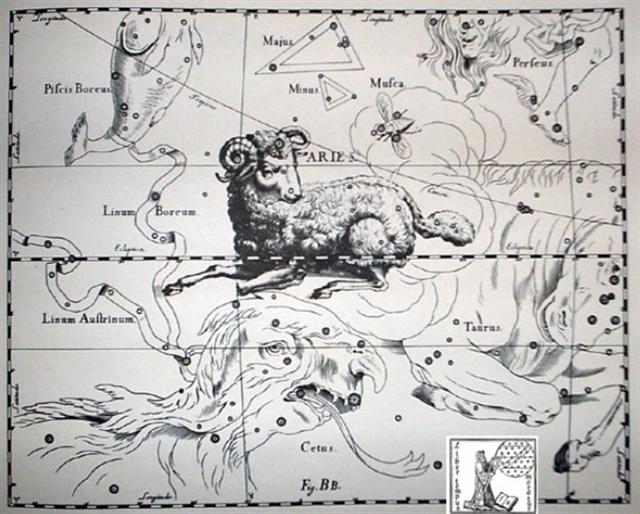 |
|







.jpg)




